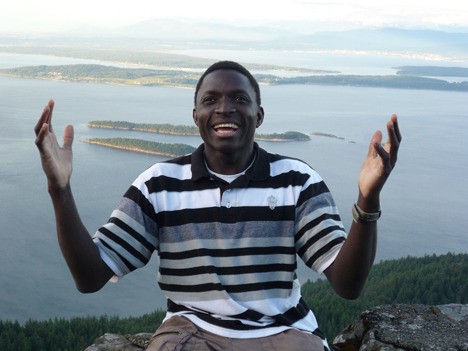Three years ago Kamara Salifu stood before the Unites States Embassy in the Republic of Sierra Leone, seeking a visa. He was penniless and on crutches, amid a crowd of wealthy applicants. The consulate asked about his financial resources, and asked what would bring him back to Sierra Leone.
“I have many ways I can come back,” he told them. “I see myself as a voice for the voiceless. I can talk to people (in the U.S.). I can tell the story of suffering.”
Salifu was stunned the following day when he was handed a U.S. visa – not for one or three months, as was common, but for three years.
“I opened my passport and started crying,” he said, and immediately hid the precious document under his clothes for safety. A woman at his church purchased his $1500 plane ticket to the U.S. and gave him $25.
Now on Orcas for the summer, Salifu is living out that promise to speak for the voiceless in his homeland.
Salifu was among the many children in Sierra Leone with a first-hand experience of the 1991-2002 Civil War, in which the population was brutalized by opposing military forces. According to BBC News and the INS, the rebel Revolutionary United Front (RUF) army assaulted Sierra Leone civilians, decapitating community leaders, mutilating and amputating the limbs of villagers and forcing young boys to join their army. The BBC estimates there were 100,000 victims of mutilation and 50,000 deaths; Handicapped International puts the number of limbless survivors in the country at 20,000.
Salifu’s entire family was killed when rebels attacked his village, Bafodia.
After surviving the war, Salifu was 14 and living with a cousin when he was crippled by polio. He remembers his cousin refusing to give him lunch for school, saying, “Who is going to give you a job? You’re disabled.” Fortunately, a kind principal helped Salifu pay for high school.
“In Africa, handicapped people are the worst outcasts; they are considered nothing,”said Salifu. “There was no love, actually.” He said handicapped people were often shoved out of waiting lines by the able-bodied and parents often abandoned disabled children.
Salifu was troubled by his country’s treatment of the handicapped and began advocating for them in public, but speaking out against the government put his life in danger.
“In Africa they don’t care whether you’re a child or not, if you’re saying something that’s really true, your life is in danger,” he said. “I don’t know who’s going to come after me at night. I was just worried,” he said of that time. Encouraged by a group of students visiting from the U.S., “I came to America for safe haven, and to start a new life,” said Salifu.
Salifu is now studying international relations and development at Clark University in Massachusetts.
His current goal is to raise enough money to complete his degree, at the same time sharing with people he meets the story of Sierra Leone’s handicapped poor.
“This is an amazing country,” he said. “People listen to you.” He is still in awe over the incredible wealth of America. “You have high school where you can go for free!” he laughs, amazed. “You have transportation, food, drinking water. There is so much opportunity here, it can change many lives back in my village.”
Salifu wants to help provide access to health care and education for the poor in Bafodia and Sierra Leone, where infant and maternal mortality are very high. His own mother often told him the story of his own birth; in labor with Salifu, she was suffering complications when two American missionaries rushed her to the hospital in their vehicle, saving both son and mother’s lives.
“Growing up in the poorest place in Africa, I know about poverty first hand,” said Salifu. He said simply giving money to poor countries has not always been successful in creating change.
“If you just give money to the poor man, sometimes they don’t know how to use it, but relationship can help them know how to use it,” he said. He hopes to build friendships with people who want to become mentors and visit Sierra Leone, as well as donating financially. He also dreams of mobilizing a team of doctors and nurses to provide free medical treatment on annual excursions to Sierra Leone.
Orcas Islander Rena Patty met Salifu at a 2007 conference in New York and helped provide him with food and shelter. He is visiting her on Orcas this summer and said she is one of his most trusted friends.
Since arriving in May, Salifu has presented his story at various island venues, forming many friendships. He spoke at a Toastmasters gathering and performed songs at Doe Bay’s open mic, setting the audience dancing. He addressed Orcas high schoolers, receiving a standing ovation and many new Facebook “friends”. He has also spoken also spoke to Congressman Rick Larsen about the effect of war on children.
“It’s been a real tough experience for me, my whole life,” he said. “I really want to be a friend for the poor. I can’t achieve this without help from people, especially education.”
While Salifu is on full scholarship at Clark, he still needs $7,000 each year to pay for living expenses like room and board. To help him with expenses, friends have organized a fundraiser dinner at the Odd Fellows Hall on July 9 at 6 p.m., with a presentation by Salifu, food, music and drumming. Tickets are $10 from Rena Patty at 376-6864, or at the door. Additional potluck dishes are welcome.



